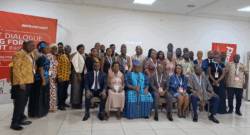It is said that there is strength in numbers. And that is exactly what happened with these five young men. After completing university, they came together, with their varying backgrounds, and set up an IT company aimed at providing learning solutions to children. It all began with the two cousins among them—Fianu and Senyo. Follow, as they narrate to the B&FT’s Inspiring Start-ups how it all started.
Background
Senyo Jiagge is a product of St. Peters Senior High School in Nkwatia-Kwahu, Eastern Region; and his cousin, Fianu Dovlo is a product of the Presbyterian Boys Senior High School in Accra. They both have their first degrees from the University of Ghana, Legon.
The two cousins both have a similar upbringing as they were introduced to computers at an early age. For Senyo, he lived in Papua New Guinea and Australia for his formative years; and Fianu spent his junior high school years in India, so they were exposed to the use of technology in learning.
However, they realised that it was a different situation in Ghana, as pupils and students had to cram—what we call in Ghana ‘chew and pour’—to pass their exams. So, in an attempt to address this problem, they decided to found a business.
The Avenir train takes off
As a famous Computer Scientist, Alan Curtis Kay, once said, “the best way to predict the future is to invent it”. That is what the two cousins did. They wanted a good future to be easy for their younger siblings who always came pestering them with homework. So, with their exposure abroad, they decided to come up with a technology that will be a tool for easy learning. They communicated their newly-found interest to some other friends who immediately bought into the idea.
The three other friends– Egya Ocran, Michael Baah-Duodu, and Frederick Tetteh, in addition to the two brothers, registered the business with the name Avenir Company Ltd.
Aside from the founders, they got on board additional five programmers and two marketers.
To kick-start the project, they engaged the services of an educational consultancy firm to develop content which would help them develop quizzes and notes using the Ghana Education Service approved syllabus.
How it works
To use the service, users would have to visit the company’s website, www.qknow.gh.com, and create an account. Then, the user, in this case, a pupil, can choose some of the subjects available and study. After this, the user can attempt to answer the question set on the subject in a quiz competition which will be immediately marked and results displayed on the spot.
The exciting thing about it is that, anytime a pupil answers a particular quiz, the score will be available for all to see so as to spark some competition among them to beat the highest scorer.
Another feature of the software that attracts the children is the use of cartoons and the incorporation of fun activities which entertain users while learning.
Currently, over 2000 pupils have subscribed to the software.
Marketing strategy
The main market for the company is schools. It has a marketing team that moves from school to school to promote the product. Usually, they arrange to be present at PTA meetings so they can explain to both the teachers and parents what the product is about and how it can help children in their learning process.
Challenges
Operating in a country where technology is fast growing but has not yet been embraced by all, it sometimes become a headache for the team to explain how it works to parents, especially those who are not tech-savvy.
Another challenge they face is with the teachers, some of who feel encouraging children to subscribe to the software will make them lazy students. So, some teachers are reluctant to buy into the idea.
How the software has impacted education
According to Senyo, the software has impacted positively on users. He recalls that a couple of parents have called to tell them that their children’s grades had improved tremendously since they were introduced to the software.
“Other parents,” he adds, “make suggestions on things they want included on our website which can even enhance the learning process.”
Vision
Avenir has a vision to become one of the leading edutech organisations in Ghana, providing learning support for children in Africa.
What government can do
For Avenir, government has a big role in helping edutech start-ups to grow. The innovators at Avenir suggest that government should partner the private sector to introduce technology in the country’s educational system, especially in public basic schools.
Advice to the youth
They young founders say the youth should never give up on their dreams and once they put their minds to something, they should pursue it relentlessly.
“Many people don’t make it on the first trial. It’s always a continuous process; so, people shouldn’t give up when times are hard. They should have hope that, with time, things will improve and the business will grow.










